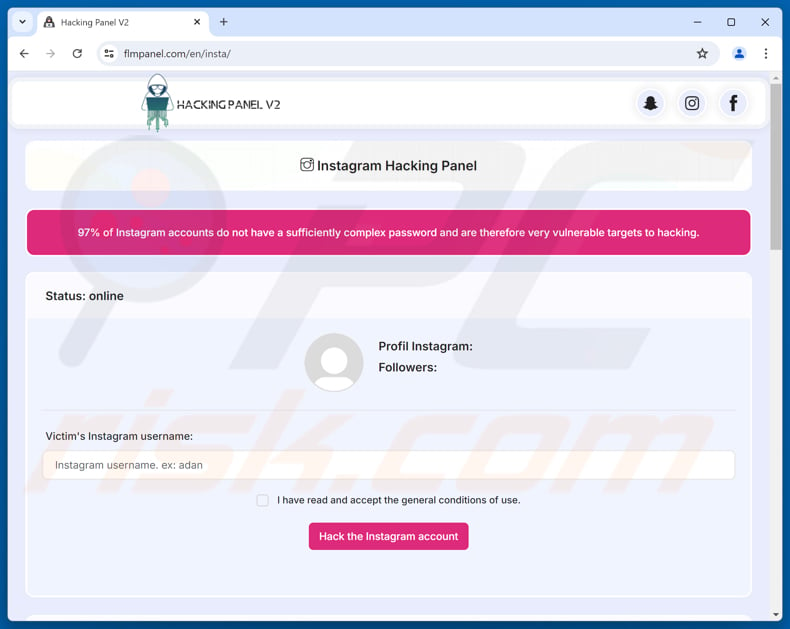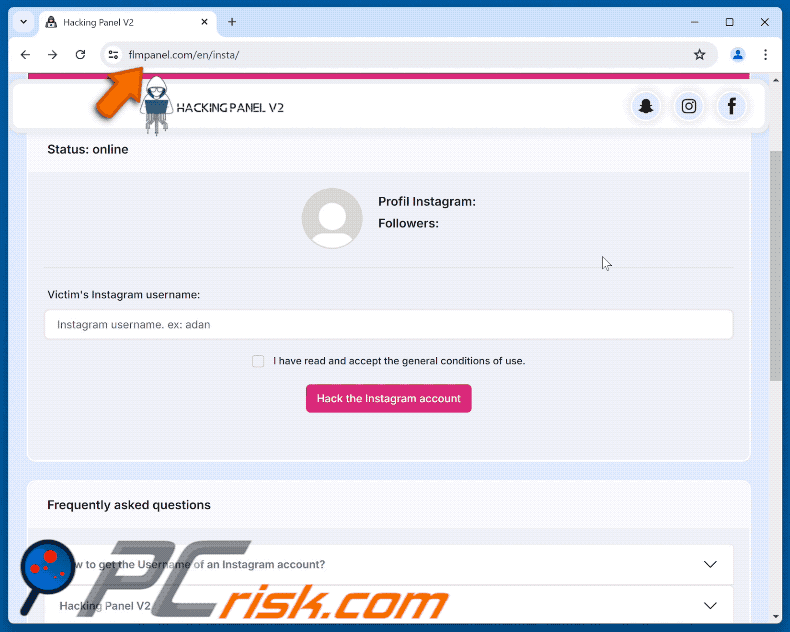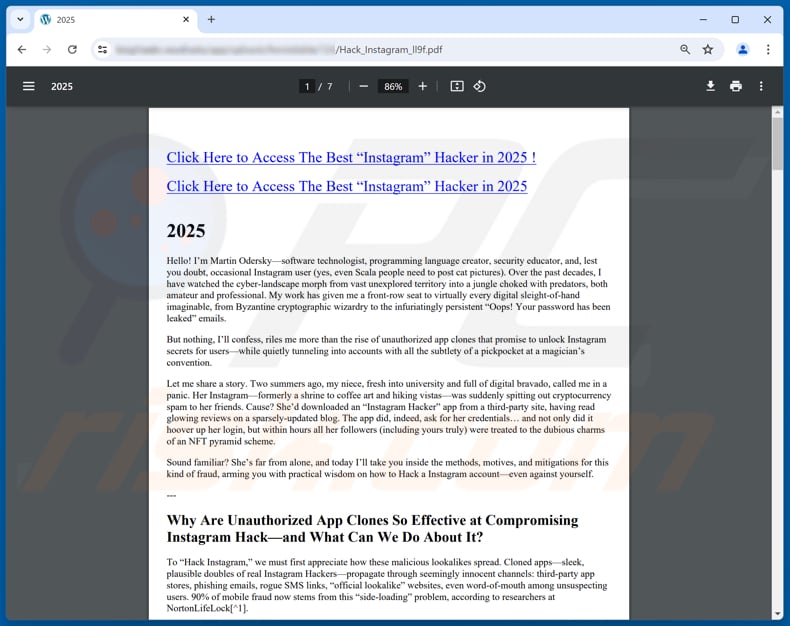How to identify scams like "Instagram Account Hack"
Phishing/ScamAlso Known As: Fake Instagram account hacking tool
Get free scan and check if your device is infected.
Remove it nowTo use full-featured product, you have to purchase a license for Combo Cleaner. Seven days free trial available. Combo Cleaner is owned and operated by RCS LT, the parent company of PCRisk.com.
What is "Instagram Account Hack" scam?
We have discovered this scheme during an inspection of a PDF file hosted on a dubious page. This scam site is supposed to provide a tool (Hacking Panel V2) for hacking Instagram accounts. Ultimately, users are directed to another web page. It is highly advisable not to trust such schemes to avoid the associated risks.

"Instagram Account Hack" scam in detail
On the fraudulent page, users offered to provide the victim's Instagram username to hack it. Upon entering the username, a process where the site supposedly injects many codes and configures the session to guarantee the anonymity of the connection is initiated. After that, the site provides an option to get the account password.
The user is then notified that they are using a trial version and prompted to purchase access to an Instagram hacking panel. The provided link is an affiliate URL that redirects to a commercial product or service (e.g., mSpy—parental control and monitoring software for phones and computers).
Overall, the discussed site lures users in with the false promise of hacking Instagram accounts, which is illegal. After simulating fake processes, it leads the user to a monetized affiliate link. The operator of the fraudulent page likely earns a commission for each sale or signup.
However, the site may also be used to promote other scams (e.g., phishing websites designed to steal login credentials or extract money from unsuspecting individuals). Either way, it is highly advisable to avoid visiting such pages and entering personal details or performing other actions on them.
| Name | Fake Instagram account hacking tool |
| Threat Type | Scam, Social Engineering, Fraud |
| Fake Claim | Users can hack Instagram accounts |
| Related Domain | flmpanel[.]com |
| Detection Names | Combo Cleaner (Phishing), Ermes (Not Recommended), Fortinet (Spam), G-Data (Phishing), Full List Of Detections (VirusTotal) |
| Symptoms | Unofficial domain, illegal offer, redirects to other websites |
| Distribution methods | Compromised websites, rogue online pop-up ads, fraudulent emails, unwanted applications. |
| Damage | Loss of sensitive private information, monetary loss, identity theft, possible malware infections. |
| Malware Removal (Windows) |
To eliminate possible malware infections, scan your computer with legitimate antivirus software. Our security researchers recommend using Combo Cleaner. Download Combo CleanerTo use full-featured product, you have to purchase a license for Combo Cleaner. 7 days free trial available. Combo Cleaner is owned and operated by RCS LT, the parent company of PCRisk.com. |
Conclusion
In conclusion, this scam is designed to exploit users by falsely promising Instagram account hacking services. Its true intent is to generate revenue through deceptive affiliate marketing and possibly in other ways. Ultimately, the page offers no hacking functionality and may lead to monetary loss, account hijacking, or other issues.
How did I open a scam website?
The Instagram Account Hack scam website is promoted using a PDF that is available for download on a questionable web page. Users are directed to this scam site through a link in the downloaded PDF. Scams can also be promoted via misleading advertisements, pop-ups, buttons, links, or other elements on shady web pages.
Furthermore, users can be lured into accessing scam websites via notifications from unreliable websites, ads delivered by adware, sites that use rogue advertising networks (e.g., various torrent sites), and emails containing fraudulent links or attachments.
How to avoid visiting scam pages?
Be careful with unexpected emails or social media messages, especially if they are from unfamiliar sources. Avoid clicking on links or opening files/attachments in these messages. Do not allow questionable websites to show notifications or interact with pop-ups, ads, or links found on these sites.
Download software only from official websites or reliable app stores, and use trusted security tools. Keep your system and applications up to date, and run regular scans to find and eliminate possible threats. If your computer is already infected with unwanted apps, we recommend running a scan with Combo Cleaner Antivirus for Windows to automatically eliminate them.
The appearance of "Instagram Account Hack" scam website (GIF):

A PDF file promoting the scam:

Instant automatic malware removal:
Manual threat removal might be a lengthy and complicated process that requires advanced IT skills. Combo Cleaner is a professional automatic malware removal tool that is recommended to get rid of malware. Download it by clicking the button below:
DOWNLOAD Combo CleanerBy downloading any software listed on this website you agree to our Privacy Policy and Terms of Use. To use full-featured product, you have to purchase a license for Combo Cleaner. 7 days free trial available. Combo Cleaner is owned and operated by RCS LT, the parent company of PCRisk.com.
Quick menu:
- What is Fake Instagram account hacking tool?
- How to identify a pop-up scam?
- How do pop-up scams work?
- How to remove fake pop-ups?
- How to prevent fake pop-ups?
- What to do if you fell for a pop-up scam?
How to identify a pop-up scam?
Pop-up windows with various fake messages are a common type of lures cybercriminals use. They collect sensitive personal data, trick Internet users into calling fake tech support numbers, subscribe to useless online services, invest in shady cryptocurrency schemes, etc.
While in the majority of cases these pop-ups don't infect users' devices with malware, they can cause direct monetary loss or could result in identity theft.
Cybercriminals strive to create their rogue pop-up windows to look trustworthy, however, scams typically have the following characteristics:
- Spelling mistakes and non-professional images - Closely inspect the information displayed in a pop-up. Spelling mistakes and unprofessional images could be a sign of a scam.
- Sense of urgency - Countdown timer with a couple of minutes on it, asking you to enter your personal information or subscribe to some online service.
- Statements that you won something - If you haven't participated in a lottery, online competition, etc., and you see a pop-up window stating that you won.
- Computer or mobile device scan - A pop-up window that scans your device and informs of detected issues - is undoubtedly a scam; webpages cannot perform such actions.
- Exclusivity - Pop-up windows stating that only you are given secret access to a financial scheme that can quickly make you rich.
Example of a pop-up scam:

How do pop-up scams work?
Cybercriminals and deceptive marketers usually use various advertising networks, search engine poisoning techniques, and shady websites to generate traffic to their pop-ups. Users land on their online lures after clicking on fake download buttons, using a torrent website, or simply clicking on an Internet search engine result.
Based on users' location and device information, they are presented with a scam pop-up. Lures presented in such pop-ups range from get-rich-quick schemes to fake virus scans.
How to remove fake pop-ups?
In most cases, pop-up scams do not infect users' devices with malware. If you encountered a scam pop-up, simply closing it should be enough. In some cases scam, pop-ups may be hard to close; in such cases - close your Internet browser and restart it.
In extremely rare cases, you might need to reset your Internet browser. For this, use our instructions explaining how to reset Internet browser settings.
How to prevent fake pop-ups?
To prevent seeing pop-up scams, you should visit only reputable websites. Torrent, Crack, free online movie streaming, YouTube video download, and other websites of similar reputation commonly redirect Internet users to pop-up scams.
To minimize the risk of encountering pop-up scams, you should keep your Internet browsers up-to-date and use reputable anti-malware application. For this purpose, we recommend Combo Cleaner Antivirus for Windows.
What to do if you fell for a pop-up scam?
This depends on the type of scam that you fell for. Most commonly, pop-up scams try to trick users into sending money, giving away personal information, or giving access to one's device.
- If you sent money to scammers: You should contact your financial institution and explain that you were scammed. If informed promptly, there's a chance to get your money back.
- If you gave away your personal information: You should change your passwords and enable two-factor authentication in all online services that you use. Visit Federal Trade Commission to report identity theft and get personalized recovery steps.
- If you let scammers connect to your device: You should scan your computer with reputable anti-malware (we recommend Combo Cleaner Antivirus for Windows) - cyber criminals could have planted trojans, keyloggers, and other malware, don't use your computer until removing possible threats.
- Help other Internet users: report Internet scams to Federal Trade Commission.
Frequently Asked Questions (FAQ)
What is a scam website?
It is a fraudulent web page designed to deceive visitors into taking harmful actions that benefit the scammers. These sites often mimic legitimate businesses, services, or brands.
What is the purpose of a scam website?
Usually, these pages are designed to trick users into providing sensitive personal or financial information, downloading malware or unwanted software, paying for non-existent services or products, transferring cryptocurrency to scammers, or taking other actions.
Why do I encounter scam websites?
Scams are often promoted through deceptive ads, pop-ups, buttons, links, and other misleading elements found on untrustworthy websites. In addition, users may be tricked into visiting scam sites through notifications from dubious pages, advertisements generated by adware, rogue advertising networks (commonly seen on torrent and piracy platforms), or fraudulent emails.
Will Combo Cleaner protect me from pop-up scams?
Combo Cleaner is built to scan every website you visit and identify potentially harmful ones. This includes scam pages. If such a page is detected, you will receive an immediate warning, and access to the site will be blocked to protect your system.
Share:

Tomas Meskauskas
Expert security researcher, professional malware analyst
I am passionate about computer security and technology. I have an experience of over 10 years working in various companies related to computer technical issue solving and Internet security. I have been working as an author and editor for pcrisk.com since 2010. Follow me on Twitter and LinkedIn to stay informed about the latest online security threats.
PCrisk security portal is brought by a company RCS LT.
Joined forces of security researchers help educate computer users about the latest online security threats. More information about the company RCS LT.
Our malware removal guides are free. However, if you want to support us you can send us a donation.
DonatePCrisk security portal is brought by a company RCS LT.
Joined forces of security researchers help educate computer users about the latest online security threats. More information about the company RCS LT.
Our malware removal guides are free. However, if you want to support us you can send us a donation.
Donate
▼ Show Discussion